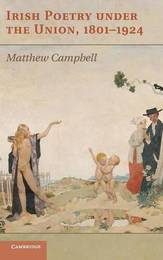
|
Irish Poetry under the Union, 1801-1924
Hardback
Main Details
| Title |
Irish Poetry under the Union, 1801-1924
|
| Authors and Contributors |
By (author) Matthew Campbell
|
| Physical Properties |
| Format:Hardback | | Pages:264 | | Dimensions(mm): Height 229,Width 152 |
|
| Category/Genre | Literary studies - c 1800 to c 1900
Literary studies - poetry and poets |
|---|
| ISBN/Barcode |
9781107044845
|
| Classifications | Dewey:821.7099415 |
|---|
| Audience | | Professional & Vocational | |
|---|
|
Publishing Details |
| Publisher |
Cambridge University Press
|
| Imprint |
Cambridge University Press
|
| Publication Date |
18 November 2013 |
| Publication Country |
United Kingdom
|
Description
This book retells the story of Irish poetry written in English between the union of Britain and Ireland in 1801 and the early years of the Irish Free State. Through careful poetic and historical analysis, Matthew Campbell offers ways to read that poetry as ruptured, musical, translated and new. The book starts with the Romantic songs and parodies of nationalist and unionist writers - Moore, Mahony, Ferguson and Mangan - in times of defeat, resurgence and famine. It continues through a discussion of English Victorian poets such as Tennyson, Arnold and Hopkins, who wrote Irish poems as the British Empire unraveled. Campbell's treatment ends with Yeats, seeking a new poetry emerging from under union in times of violence and civil war. The book offers both a literary history of nineteenth-century Irish poetry and a way of reading it for scholars of Irish studies as well as Romantic and Victorian literature.
Author Biography
Matthew Campbell is Professor of Modern Literature at the University of York. He holds a BA from Trinity College Dublin and a PhD from the University of Cambridge. He is the author of Rhythm and Will in Victorian Poetry (1999) and the editor of The Cambridge Companion to Contemporary Irish Poetry (Cambridge, 2003).
Reviews'... this is a marvellously rewarding book, sceptical of current orthodoxies, and staking its case on the incisive, engaged, and witty close readings that set off its arguments so persuasively.' David Wheatley, Breac: A Digital Journal of Irish Studies '[Campbell's] book is a thoughtful, detailed and deeply researched account ...' Marion Shaw, Tennyson Research Bulletin
|